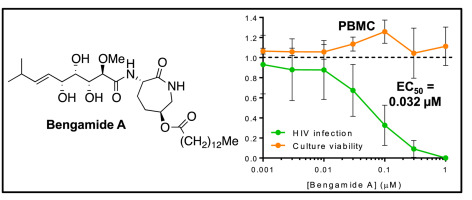Antiviral Research ( IF 7.6 ) Pub Date : 2018-02-22 , DOI: 10.1016/j.antiviral.2018.02.017 Ian Tietjen , David E. Williams , Silven Read , Xiaomei T. Kuang , Philip Mwimanzi , Emmanuelle Wilhelm , Tristan Markle , Natalie N. Kinloch , Cassandra N. Naphen , Karen Tenney , Thibault Mesplède , Mark A. Wainberg , Phillip Crews , Brendan Bell , Raymond J. Andersen , Zabrina L. Brumme , Mark A. Brockman

|
HIV-1 inhibitors that act by mechanisms distinct from existing antiretrovirals can provide novel insights into viral replication and potentially inform development of new therapeutics. Using a multi-cycle HIV-1 replication assay, we screened 252 pure compounds derived from marine invertebrates and microorganisms and identified 6 (actinomycin Z2, bastadin 6, bengamide A, haliclonacyclamine A + B, keramamine C, neopetrosiamide B) that inhibited HIV-1 with 50% effective concentrations (EC50s) of 3.8 μM or less. The most potent inhibitor, bengamide A, blocked HIV-1 in a T cell line with an EC50 of 0.015 μM and in peripheral blood mononuclear cells with an EC50 of 0.032 μM. Bengamide A was previously described to inhibit NF-κB signaling. Consistent with this mechanism, bengamide A suppressed reporter expression from an NF-κB-driven minimal promoter and an HIV-1 long terminal repeat (LTR) with conserved NF-κB response elements, but lacked activity against an LTR construct with mutation of these elements. In single-cycle HIV-1 infection assays, bengamide A also suppressed viral protein expression when viruses encoded an intact LTR but exhibited minimal activity against those with mutated NF-κB elements. Finally, bengamide A did not inhibit viral DNA accumulation, indicating that it likely acts downstream of this step in HIV-1 replication. Our study identifies multiple new antiviral compounds including an unusually potent inhibitor of HIV-1 gene expression.
中文翻译:

海洋天然产物苯甲酰胺A对NF-κB依赖性HIV-1复制的抑制
通过与现有抗逆转录病毒药物不同的机制起作用的HIV-1抑制剂可以为病毒复制提供新的见解,并有可能为新疗法的开发提供信息。使用多周期HIV-1复制测定法,我们筛选了252种源自海洋无脊椎动物和微生物的纯化合物,并鉴定了6种抑制HIV的化合物(放线菌素Z 2,巴斯塔丁6,苯甲酰胺A,卤代环素A + B,keramamine C,新石油酰胺B) -1的有效浓度(EC 50 s)的50%等于或小于3.8μM。最有效的抑制剂,苯甲酰胺A,在T细胞系中的HIV 50为0.015μM,在外周血单核细胞中,其EC 50为50,从而阻断了HIV-1的表达。为0.032μM。先前曾描述过Bengamide A可抑制NF-κB信号传导。与此机制一致,苯甲酰胺A抑制了NF-κB驱动的最小启动子和带有保守NF-κB反应元件的HIV-1长末端重复序列(LTR)的报告基因表达,但对具有这些元件突变的LTR构建体缺乏活性。在单周期HIV-1感染检测中,当病毒编码完整的LTR,但对具有突变NF-κB元素的病毒表现出最小的活性时,苯甲酰胺A也会抑制病毒蛋白的表达。最后,苯甲酰胺A不能抑制病毒DNA的积累,表明它可能在HIV-1复制的这一步骤的下游起作用。我们的研究确定了多种新的抗病毒化合物,其中包括一种异常有效的HIV-1基因表达抑制剂。



























 京公网安备 11010802027423号
京公网安备 11010802027423号